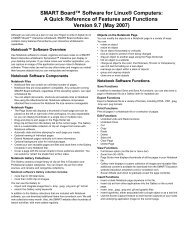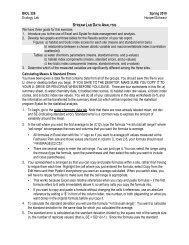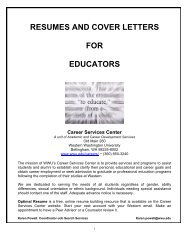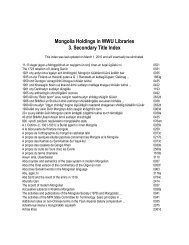Recreation Program Application Process - Western Washington ...
Recreation Program Application Process - Western Washington ...
Recreation Program Application Process - Western Washington ...
Create successful ePaper yourself
Turn your PDF publications into a flip-book with our unique Google optimized e-Paper software.
<strong>Recreation</strong> <strong>Program</strong>PEHR Department<strong>Western</strong> <strong>Washington</strong> UniversityBellingham, WA 98225-9067360-650-3782 • Old Carver 6www.wwu.edu/pehr/<strong>Recreation</strong>/index.shtmlkatey.roemmele@wwu.edu<strong>Recreation</strong> <strong>Program</strong> <strong>Application</strong> <strong>Process</strong>Priority Deadline: First Thursday in NovemberThe application process consists of the following four parts. Please turn in all paperwork to Katey in Old Carver 6.The priority deadline is the first Thursday in November. <strong>Application</strong>s will be accepted after the prioritydeadline date if space is available in the program.The entire application packet is separate from the application to <strong>Western</strong> <strong>Washington</strong> University. Admission to the<strong>Recreation</strong> <strong>Program</strong> is contingent on admission to <strong>Western</strong> <strong>Washington</strong> University.1. General information: Please address the bullets below in a typed Word document: Date Name Student # Local address (street address, city, state, zip) Permanent address (street address, city, state, zip) WWU email address Other email address Local phone Cell phone Permanent phone College(s) attendedo Name of college(s), dates attended, area of study and GPA Work Experience (volunteer or paid) Life Experience (travel, special experiences, etc.) Leisure Interests / <strong>Recreation</strong> Skills Interest Area(s): _____ Community <strong>Recreation</strong> _____ Outdoor <strong>Recreation</strong> _____ Tourism_____ Therapeutic <strong>Recreation</strong> _____ Generalist _____ Undecided2. Include a double-spaced, 2-3 page essay that addresses the following questions: Why are you interested in a career in recreation and leisure services? What contributions do you think you can make to the field of recreation and leisure services? What can you contribute to the <strong>Recreation</strong> <strong>Program</strong> and what do you expect to receive from it? Optional: Discuss any other relevant factors that may help us better understand you.3. Please attach an official or unofficial transcript of all college coursework, both here at WWU and at any othercolleges you have attended.4. Schedule an interview with a member of the faculty after all materials have been submitted. You should give thefaculty member a day or two to review your application before your interview. (Sign up in CV 6.)1
Admission to the <strong>Recreation</strong> <strong>Program</strong> is based on the following criteria:Rec 201 (Foundations of <strong>Recreation</strong> and Leisure) must be successfully completed (minimum grade of “C”)before students may start Phase I. Students who have successfully completed the equivalent of Rec 201may have it waived with prior permission. (Rec 201 is offered fall and winter quarters only.)Grade Point Average: The minimum acceptable GPA is 2.0. However, most students who are admitted tothe program have GPAs well above the minimum.Interview: The interview includes questions related to the student’s background, work and life experiences;interest in recreation and leisure as a career; and academic strengths and weaknesses. The student isresponsible for scheduling an appointment before the deadline.Essay: See preceding comments on “essay.”Experience: Evidence of paid or non-paid experience in recreation-related positions is preferred. Otherrelevant work and life experiences are also considered.Important Information About Applying to the <strong>Recreation</strong> <strong>Program</strong>:All students, including transfers, must apply for admission to the <strong>Program</strong>. Transfer students are urged tocontact the <strong>Recreation</strong> <strong>Program</strong> well in advance for guidance and further information.Students must have reached sophomore status by the spring quarter they plan to begin the program.The number of students admitted to the program each year is limited to about sixty. The number ofapplications sometimes exceeds available openings. Students should prepare their material carefully andcompletely.Applicants should first submit their materials to the program secretary in Old Carver 6 and then schedule aninterview with a faculty member prior to the deadline.The priority deadline for completing all aspects of the application process (including the interview) is thefirst Thursday in November. <strong>Application</strong>s will be accepted after the priority deadline date if space isavailable in the program.For priority applicants, the faculty will make the final decisions in mid-November. Letters of admittancewill go out to applicants prior to Thanksgiving break.2
Bachelor of Arts Degree – <strong>Recreation</strong><strong>Western</strong> <strong>Washington</strong> University’s <strong>Recreation</strong> <strong>Program</strong> prepares students for careers planning, developing, anddelivering leisure services in response to the needs of society for health, well-being, and quality of life. Thecurriculum adapts the quarter system to a “Phase” structure. Once admitted to the major, students enter Phase I ofthe curriculum during spring quarter. They continue through the curriculum as indicated by the schedule below.Students must have at least sophomore status to begin the program and the Phase curriculum must be completed insequence.FALL WINTER SPRING SUMMERFreshman GURs GURs GURsSophomore 201 / GURs / 201 / GURs Phase ISupport Area Support AreaJunior GURs / Phase II Phase III or Phase IIISupport AreaSeniorPhase IVMajor Concentration: 66 creditsCompletion of Rec 201, Phases I, II, III and IVSupport Areas: 25 creditsIn addition to the Phase requirements, <strong>Recreation</strong> majors must complete a 25-credit support area. Supportarea plans are developed with and approved by the student’s faculty advisor and may take either the formof a traditional minor or an interdisciplinary study. See an advisor for more information.3
COURSES IN RECREATIONPREREQUISITE COURSE201 Foundations of <strong>Recreation</strong> and Leisure (4) [Fall or Winter prior to entering Phase I]Prereq: Sophomore status or permission. Professional course dealing with the history, philosophy, presentstatus, future goals, and challenges of leisure and the recreation service professions.PHASE I (Spring) – 16 credits271 Introduction to Community <strong>Recreation</strong> (3)Prereq: Rec 201; majors only. Introduction to the major professional agencies, philosophies, functions,services, personnel and facilities. Emphasis on the diversity and inter-relatedness of community recreationservice agencies.272 Introduction to Outdoor <strong>Recreation</strong> (3)Prereq: Rec 201; majors only. Introduction to the major professional components of the outdoor recreationfield; interpretive services, camping, resource management; programming, private recreation and tourism.Focuses on trends, programs and related professional issues.274 Introduction to Therapeutic <strong>Recreation</strong> (4)Prereq: Rec 201; majors only. Introduction to the principles and practices of therapeutic recreation.Includes history, philosophy, trends and issues. Also presents an overview of consumer groups associatedwith therapeutic recreation.275 Professional Practicum and Seminar (1)Prereq: Rec 201; majors only. S/U grading. Career opportunities in leisure services investigated throughorganized visits to recreation and leisure agencies. Includes class meetings to explore professionaldevelopment.276 <strong>Program</strong> Leadership (2)Prereq: Rec 201; majors only. Leading and processing recreation experiences that promote individual andsocial well being in community, outdoor and therapeutic settings.279 Introduction to Tourism (3)Prereq: Rec 201; majors only. Introduction to the major professional components of tourism: tourdevelopment, guiding, visitor services, resort management, and event planning. Also examines history oftravel, types of travelers, motives of travel, niche markets, and current trends.PRE-PHASE II Therapeutic <strong>Recreation</strong> Concentration ONLY380 Therapeutic <strong>Recreation</strong> Principles, Practices and Techniques (5)Prereq: Rec 201, Phase I or appropriate experience and written permission. Concentrated analysis of theprocess and practice of therapeutic recreation. Includes medical terminology, disabling conditions,adaptations, models of health care, rehabilitation techniques, and further examination of the foundationsand development of therapeutic recreation. Includes one hour arranged.4
PHASE II (Winter) – 16 credits370* Outdoor <strong>Program</strong> Development (4)Prereq: Phase I or appropriate experience and written permission. Methods and techniques in theorganization, implementation and evaluation of recreation programs in outdoor settings.372 Management of <strong>Recreation</strong> and Leisure Services (4)Prereq: Phase I. Entry-level administrative knowledge and skills for managing personnel and organizationalresources in recreation and leisure services.373 <strong>Recreation</strong> <strong>Program</strong>ming (4)Prereq: Phase I. Systems approach to programming methods for individual and group program planning inall recreation and leisure settings.376* Therapeutic <strong>Recreation</strong> <strong>Program</strong> Design (4)Prereq: Phase I or appropriate experience and written permission. Development of comprehensive, specific,and individualized therapeutic recreation programs designed for clinical settings.378 Human Relations: Concepts and Skills (4)Prereq: Phase I. Knowledge of human relations concepts and development of basic helping skills needed byprofessionals working in a variety of recreation settings. Focuses on improving public and personnelrelations in professional settings and on enhancing the quality of leisure experiences for individuals..379* Tourism Planning and Development (4)Prereq: Phase I or written permission. Study of the nature and process of planning as a function of tourismindustry development; focus on the application of resource and activity planning principles to therecreational travel and tourism experience.385* Leisure and Aging (4)An overview of aging with respect to leisure services. Examines physical, social, psychological, economicand political aspects of aging as they relate to designing recreation programs and leisure opportunities.*Students choose one of four courses marked with an asterisk in Phase II.PHASE III (Spring or Summer) – 15 credits473 Internship III (15) - Springor472 Internship II (12) – SummerANDRec 471 Internship I (3) – Spring or FallPrereq: Phase II. Full-time supervised professional experience emphasizing functional proficiency underjoint sponsorship of University and agency personnel. S/U grading.5
Students are also required to complete a minimum of 240 hours of approved paid or unpaid fieldwork experience in recreation and leisure services prior to registering for their Internship. Seeimportant summer quarter internship information below.Students planning to do a summer internship (Rec 472, Internship II) must register for Rec471 (Internship I) either the quarter before or the quarter after the internship. This gives studentsthe full 15 credits for their internship. Rec 471 provides the additional three credits only; there isno work to be done for this class as all the work is done during the summer quarter internship.Students should see their advisors for further information.PHASE IV (Fall) – 15 credits421* Therapeutic <strong>Recreation</strong> Trends and Issues (3)Prereq: Phase III or appropriate experience and written permission. An analysis of trends and issuesimpacting theory recreation.444 <strong>Recreation</strong> Budgeting and Finance (4)Prereq: Phase III. Principles and techniques of obtaining, budgeting and managing financial resources inparks and recreation agencies.450 <strong>Recreation</strong> <strong>Program</strong> Evaluation (4)Prereq: Phase III. Quantitative and qualitative methods of program evaluation in recreation and leisureservices.470* Adventure-Based <strong>Program</strong>ming (3)Prereq: Phase III. Methods and techniques in the assessment, design, implementation and evaluation ofadventure programs in enrichment and therapeutic recreation settings.475* Community Development and Leisure Services (3)Prereq: Phase III or permission of instructor. An analysis of community development from the context ofrecreation and leisure services. The roles and relationships among community members and recreation andleisure services are emphasized for the purposes of promoting the health and well-being of communities.479* Ecotourism: Principles and Practices (3)Prereq: Rec 379 or permission of instructor. Provides an understanding of the principles and practices ofecotourism. Examines theory, practice, history, terminology and issues in ecotourism planning andmanagement. Emphasizes sustainable practices as they relate to traveler education, tour planning, anddestination development.480 Leisure and Society (4)Prereq: Phase III. Senior capstone that builds on general education and foundations of professionaleducation. Goal is to synthesize diverse strands of theory and practice into an integrated understanding ofrecreation and leisure in modern society, with implications for professional service.*Students choose one of four courses marked with an asterisk in Phase IV.6(Revised Winter 2013)


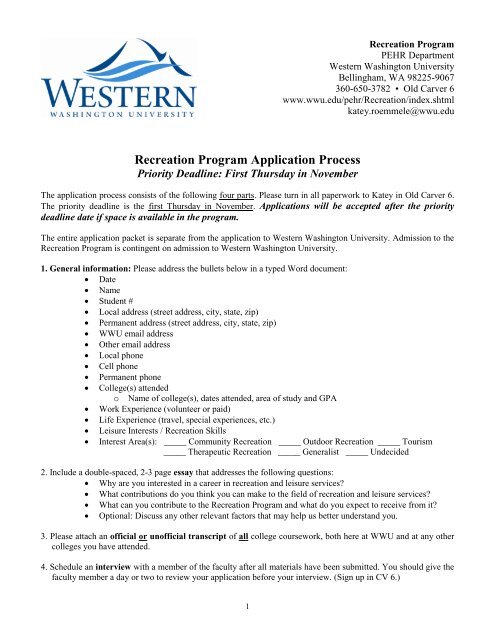
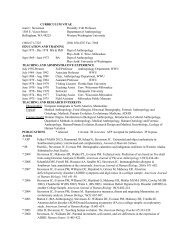
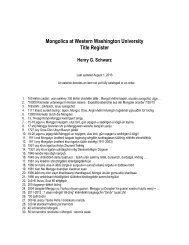

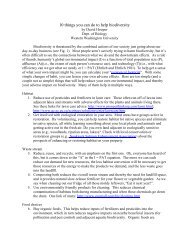
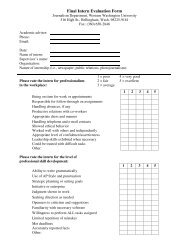
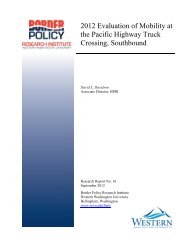
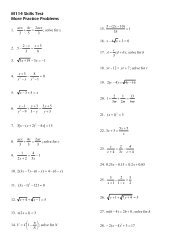
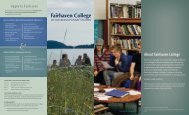
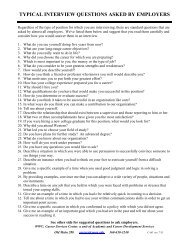
![stinky bob herb robert[1]](https://img.yumpu.com/32082145/1/190x146/stinky-bob-herb-robert1.jpg?quality=85)
